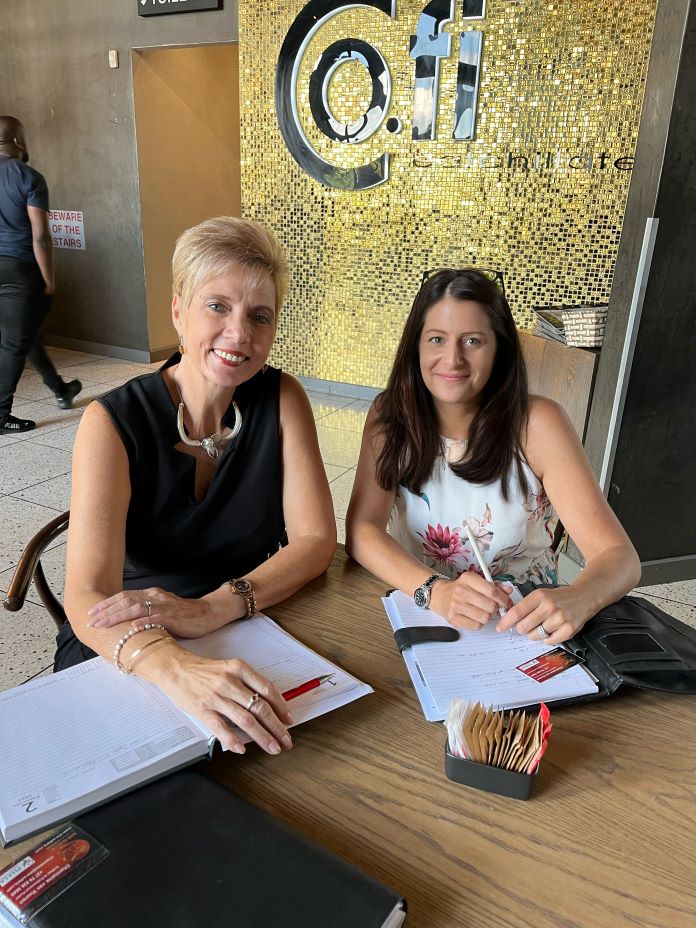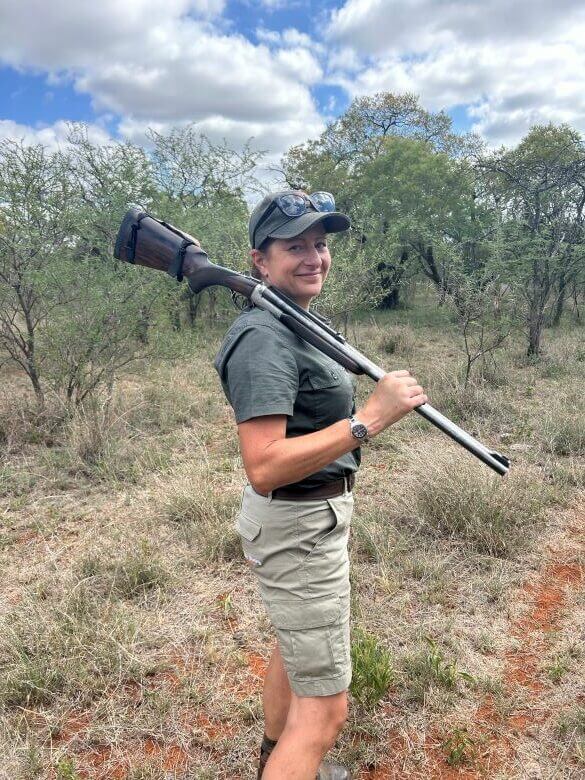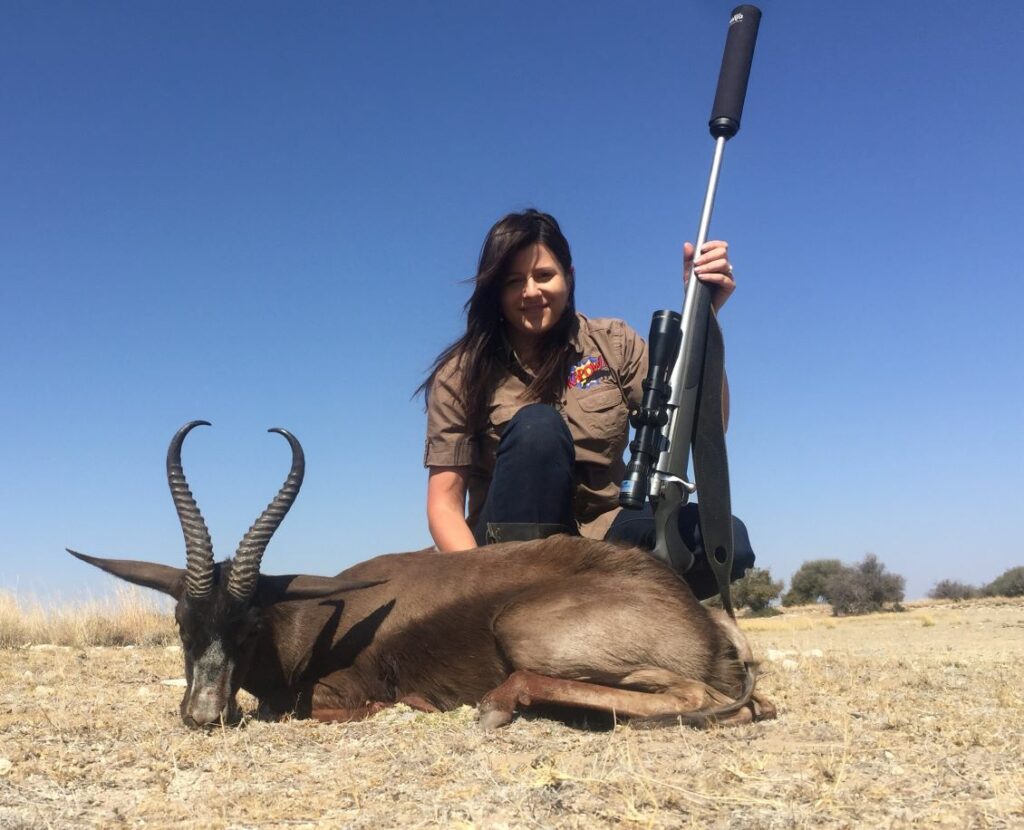In recent years, a remarkable shift has been observed in the demographics of safari hunters, with an increasing number of women taking up the sport and hunting in Africa. This reflects a fundamental shift in the dynamics of the safari hunting world, resulting in a combination of factors that cater to the unique needs, preferences, and experiences of female hunters. This change can also be attributed to many other factors, ranging from the way that society sees women to the pursuit of empowerment and a deeper connection to nature.
[DYNAMIC-BLOGTABLEOFCONTENT]
The role of gender in the history of game hunting
At the heart of this ongoing change is the emergence of societal attitudes toward gender roles. Historically seen as a male-dominated activity, safari hunting has transformed perception, becoming more inclusive and accessible to individuals of all genders. This is seen as more and more women become qualified as professional hunters and outfitters. As traditional gender norms continue to change, women are increasingly empowered to explore and engage in activities that were once considered exclusively masculine. This societal change has created a fertile ground for women to embrace game hunting as a form of self-expression and empowerment.
Furthermore, the democratization of information and resources has played a major role in enabling women’s entry into the world of African game hunting safaris. Advancements in technology and the vast amounts of online platforms have made it easier than ever for women to access educational materials, connect with like-minded individuals, and acquire the necessary skills and knowledge to partake in game hunting activities. From online forums and social media groups, like “Women of the Wild” and “Women Who Shoot, Hunt and Fish” to specialized workshops and training programs, women now have a wealth of resources at their disposal to support their journey into the safari hunting community.

Connecting Through Game Hunting Opportunities
Beyond just empowerment, big game hunting offers women a unique opportunity to reconnect with nature and enjoy a deeper appreciation for the environment. In an increasingly grey concrete world, many women are drawn to the serene beauty of the bushveld and the primal thrill of tracking game through untamed landscapes. For some, game hunting represents a form of escapism—a chance to escape the hustle and bustle of modern life and immerse themselves in the tranquility of nature. For others, it is a means of conservation and a way of promoting sustainable game hunting practices, also allowing them to actively contribute to local communities by donating meat from the hunt.
Moreover, the health and wellness benefits associated with game hunting safaris are clear. Unlike traditional forms of exercise that confine individuals to indoor gyms or urban environments, hunting offers a dynamic and immersive experience that engages both the body and the mind. From trekking through rugged bushveld to honing tracking skills and marksmanship, hunting safaris demands not only physical fitness but mental and emotional strength. As such, it provides women with a well-rounded approach to health and wellness, promoting physical vitality, mental clarity, and emotional well-being.

In addition to its physical and psychological benefits, game hunting holds an important cultural and social significance for many women. For some, it serves as a means of preserving ancestral traditions and cultural heritage, passing down time-honored skills and knowledge from one generation to the next. For others, it fosters a sense of camaraderie and belonging within the hunting community, forging deep and lasting bonds with fellow women. Whether game hunting alone or in the company of others, women find happiness and satisfaction in the shared pursuit of a common passion.
Another benefit is that game hunting offers women a unique opportunity to reclaim their power and assert their autonomy in a male-dominated world. In a society where women are often relegated to the role of passive observers or spectators, hunting empowers them to take control of their destiny and chart their own course. Whether navigating the bushveld, tracking game or harvesting their own food, women discover a newfound sense of self-reliance and self-sufficiency that goes beyond societal expectations and gender norms.
Moreover, hunting in Africa has a huge impact on conservation. We all know that hunting is the biggest single contributor to conservation. Without hunters, whole communities would potentially collapse (or resort to poaching), as many are reliant on the employment opportunities that hunting creates. Employment is created in positions such as chefs, cleaners, skinners, trackers, guides, and professional hunters and these positions would not be available if there weren’t any hunters.
As advocates for the preservation of wildlife and natural habitats, women hunters and hunters, in general, contribute a crucial role in promoting sustainable hunting practices and advocating for the protection of endangered species. It is only through hunting that some previously endangered species are now thriving, for example, the Scimitar Oryx is bred by farmers specifically to be hunted, thereby ensuring the numbers of these animals increase. Through their active involvement in hunting and hunting-related industries, women hunters are contributing to wildlife management conservation efforts. Hunters in general spend double if not more as opposed to non-hunting tourists (these are for example the bird watchers or photographic tourists).
Hunting Safaris: A Vibrant and Thriving Tradition
In conclusion, the growing interest and involvement of women in hunting can be attributed to a convergence of societal, cultural, environmental, and personal factors. As women continue to challenge gender norms, embrace empowerment, and forge deeper connections with nature, the landscape of hunting in Africa will undoubtedly continue to evolve and diversify.
By celebrating the contributions of women to the hunting community and fostering an inclusive and welcoming environment for all enthusiasts, we can ensure that game hunting remains a vibrant and thriving tradition for generations to come.
